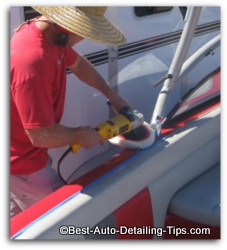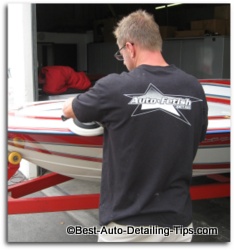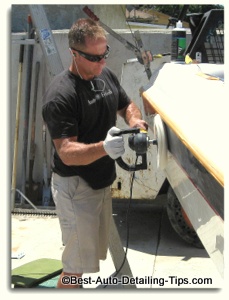Best Boat Polisher Review
Questions you didn't even know to ask
Finding the best boat polisher might seem like a simple task at first glance, but in an era of information overload many of you will find yourselves sifting through mounds of opinions and reviews.
Likely you will come away feeling more informed than ever, and yet, find that you are frozen with anxiety as to which is really the best boat buffer.
Asking the right questions seems like an obvious solution until you quickly realize you lack even the experience or knowledge to ask the right questions.
So if you find yourself quickly becoming frustrating during the deciding process, follow along as I lay out the dots for you to connect, and see what the perfect boat polisher for you and your world is!
Finding the Best Boat Polisher is About Asking the Right Questions
Finding the best buffer to polish a boat with will be more than finding a quality buffer. Cars are not boats and boats are not cars.
While most people realize boats are different than cars, they think that they are close enough to follow the same lines of logic as they would in choosing a quality car buffer.
The good news is that all the buffers on this page can also be used to polish both cars and boats with.
The main problem with most boat polisher reviews is that people with little to no experience recommend the typical random orbital car polishers that will in most cases, prove ineffective on boats.
Gel Coat is Not Car Paint:
While this is an obvious to most, the fact remains that despite the fact that you are probably a boat owner, my experience has shown that very few boat owners understand the nature of the beast when it comes to gel coat or fiberglass. Let's lay out some facts regarding gel coat:
- Gel coat is not just a material, but also a process used to make boats.
- Fiberglass is not the final material in making boats, but more specifically refers to the fiberglass cloth that is used prior to the gel coat top coat used in boat making.
- When people refer to fiberglass waxing, polishing, or oxidation, it is more correct to say gel coat as this is the material on the outside that you are dealing with.
- Gel coat has no final protective coating like clear coat on a car, and is a very tough, durable, and relatively cheap material.
- When we talk about gel coat being tough and durable, this is not to be confused with its ability to not oxidize, as gel coat does oxidize very quickly as it is exposed to weather and the elements.
- Anyone who has tried to wax a boat or RV with any level of oxidation will know how difficult it is as the oxidized and porous gel coat will literally soak-up any of the wax and make more of a mess than anything else.
Why a Traditional Car Buffer Will Not Work:
Gel coat is very tough, durable material while also being very porous. This material will oxidize and create a dull, sometimes chalky effect that will soak-up dirt and pollution.
What adds additional complexity and confusion for boat owners is that often your boat will still appear to have some shine to it.
And for this reason most boat owners like yourself will assume that aggressive boat polishing techniques and products are not needed....until you try polishing your boat with the simplest and least aggressive method by using a boat cleaner wax.
The Rude Reality!
The rude awakening for any first time boat owner (when I say first, what I really mean is more about your first time trying to polish your boat, rather than actually just owning a boat for the first time. I know many boat owners who have never attempted to polish their own boat) is when you try to wax or polish your boat. It usually goes something like this:
- You either get a "new" boat, or you decide that your current boat could use some freshening-up in the form of waxing and polishing to restore some of that shine and luster you feel it has lost.
- You run to the auto parts store or the local boat center and look for the "best boat wax". (after all, we all want the "best" right?)
- Suddenly you are standing in the aisle looking at not only a vast selection of car waxes (wondering if you can in fact use a car wax on your boat; which the simple answer is yes. The real question is if that car wax will actually do what you need it to do. But I am getting ahead of myself...)
- You finally narrow your attention down to a few choices in dedicated boat waxes, marine waxes, boat cleaner waxes, marine grade polishes, etc., etc. (you are beginning to feel a little anxious as this point)
- Now you stand there trying to make a decision after reading the labels of the different choices, while all the endless opinions when it comes to boat polishing simultaneously stream through your head while trying to pick out the perfect product in which to polish your boat.
- Upon making your choice, you head home with both a feeling of excitement and anxiety that progressively builds in your gut as you anticipate the "moment of truth".
- You whip out the closest rag you can find as your anticipation, excitement, and anxiety build to an overwhelming level!
- You skim back over the instructions of the "best boat wax" (just to confirm before you commit yourself) and hastily rush to test out this product on your boat to check the results.
- You apply the product to the rag, you begin to rub, all the while checking to see the newly shined section that you have now created.
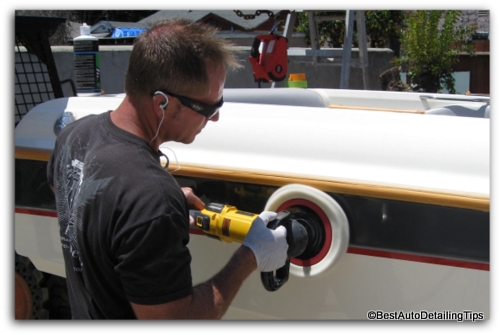
- And low and behold, based on the condition of your boat, you will see that in fact some degree of improvement has been achieved.
- But that is not good enough. Because if one application can do that, then a second application and rubbing will certainly create even more shine. So you "rinse and repeat", all the while rubbing harder and harder each time. (after all; if rubbing hard can do this, then rubbing harder will certainly be better)
- At this point you start to move to another section as your working area expands and you start to feel a sense of accomplishment.
- At this point you are either going to be satisfied with your results (because your boat is not overly oxidized and your expectations are still relatively low) or you will come to the harsh conclusion that your attempts seem mostly in vain as your choice in product does not seem to be producing the results you were expecting. (wait till you look at this section from different angles as you see that the area you have polished by hand is creating a blotchy appearance. It will certainly be "shinier", but also blotchy in appearance as you examine your boat from different angles.)
- Now is about the point that you start thinking that you really need to go shopping for the best boat polisher. (once again, you want the best of course)
- But this is likely when you start recycling all the bad information and opinions that you have collected over time from endless so-called experts. (the boat forums, your "good-intentioned" neighbor, the owner of the local boat store, the other boat owner who lives across the street, etc., etc. The world has never suffered from a shortage of people with opinions. But most opinions basically suck.)
- You have likely heard an endless array of conflicting opinions when it comes to boat polishing, boat polishers, compounds, waxes, marine grade, etc., etc. (see bullet point above)
- Never use a high-speed polisher. Always polish by hand. You have to find a marine grade wax. A carnauba wax is the best. A synthetic sealant is the best. Blah, blah, blah and more blah! (are you as frustrated as I am yet?)
Because your situation is truly unique, the level of oxidation, overall condition, and many other factors, there is no simple answer that I can give to everyone.
But the one thing I do know is that every boat will begin to oxidize the moment it it comes off the production line.
Most boat owners simply do not realize just how susceptible their boat is to oxidizing. And just because your boat is still "shiny", doesn't mean it hasn't started to oxidize.
I have seen plenty of boats that are kept indoors, meticulously maintained, but when I go to polish them, low and behold I find that in fact they are oxidized and cannot simply be "rubbed out" by hand and will require the use of one the high-speed rotary polishers below.
It is interesting to me after doing literally hundreds of boats in my career, just how many boat owners are perplexed when I am standing there, looking at there well maintained boat that is still shiny, and inform them that there is in fact some oxidation on their boat.
It is at this point that the oxidation fully reveals itself when a person like myself, or you in this case, goes to wax their boat and begins to realize a few things:
- The wax either soaks up so quickly that is is difficult to apply, and/or more difficult to remove.
- That a blotchy effect is created as you wax from section to section.
- You are unable to fully restore the shine at all, or that the level of shine you are able to create delivers an uneven appearance from section to section as you scrutinize your work from different angles of lighting.
For this reason traditional boat waxes/car waxes will not work, just as trying to restore the shine by polishing by hand will also not work - well, it kinda' works.
Unless your boat is in pristine condition, you will require a specialized type of buffer known as the infamous high-speed polisher. These high-speed polishers are going to be the required choice if you want true professional grade results as well as permanent results.
And when I say results, I mean the ability to remove levels of oxidation as well as the ability to remove scratches from the gel coat. High-speed (also called rotary) polishers are the only animals with the ability to produce the necessary heat and friction for the more aggressive polishing that gel coats require.
"Don't Freak Out!"
I have some good news for you:
- The high-speed, rotary boat polisher(s) of today are much more user-friendly than any inexperienced person realizes.
- The newest boat polisher(s) start at very low RPM speeds that make them incredibly safe and friendly even for the true beginner. (600 RPM's)
- These boat polisher(s) are the same rotary polishers that professionals like myself also use when polishing on cars. (this can represent a greater winning combination for you if you have ever thought about learning how to do car polishing)
- Polishing gel coat in many ways is safer than polishing on a car due to the fact that gel coat is such a tough material. (this represents a good problem if you are a complete beginner as gel coat makes a great starting point to become acquainted with a rotary polisher)
- The difficulty with polishing gel coat is that unless you are a seasoned pro, you will not understand just how much work at all levels that is required to polish a boat to fully remove oxidation. (with that being said, it is easy to create a much greater level of shine using one of these professional boat polisher(s) and the right compounds than trying to "rub out" your boat by hand)
- The real points you need to understand is that if you have ever polished a car, you will make some automatic comparisons that will mess with your head. Working on gel coat requires a far greater amount of speed, friction, products (compounds/polishes), aggressive polishing pads (wool pads) then is required for polishing a car.
- Even if you have never polished a car by hand or with a buffer, you will still grossly underestimate just how aggressive you can get, and will be required to get for truly professional level results.
While I realized I may have just scared a vast majority of you away from the possibility of buying a boat polisher and attempting to polish your boat, as long as you accept it is going to be some work, you should not be discouraged.
Once again, since gel coat is such a durable material, it would be very difficult to mess up your boat with one of these buffers.
And in the event that you just can't see yourself using a high-speed polisher to polish your boat and you want to go with what is considered the safer choice by many of the so-called experts and friends around you, I suggest you look at my page on random orbital polishers.
Start with the Right Boat Polishing Compound
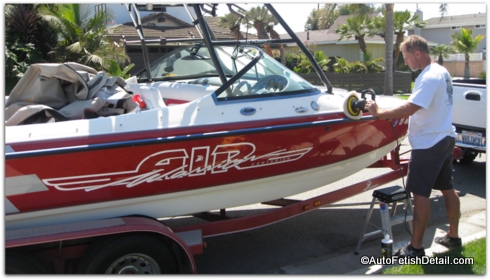
Even though you are here to find the best boat polisher, you will still need a product to actually use with your boat polisher.
I will give you (2) options to help you decide on which gelcoat compound/polish to use:
Option 1: 3M Heavy Duty Compound
This is where I would start since I know most boat owners do not go looking for a boat polisher until their boat as a significant amount of oxidation.
I also know that most boat owners underestimate how much work and aggressive compounds are required to remove even what most owners would label as "not that much oxidation".
Therefore I am going to start with the heavy duty compound like this one from 3M.
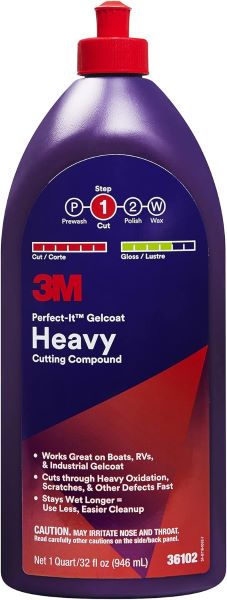
3M Heavy-Duty Gelcoat Compound on Amazon
- Trusted name of 3M
- Can be used on any degree of oxidation: from mild to wild!
Option 2: The option most of you will take
I accept that you would not be here unless this was your first attempt to polish your boat. Therefore you will autamatically play it cautious.
You will also like the idea that you can booth polish your boat to remove oxidation, restore shine, while also adding some protection in the form of a wax.
Which then leads you to this other product from 3M:
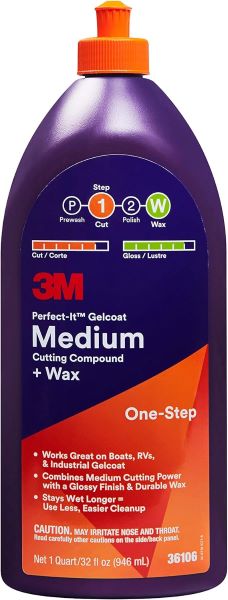
3M Medium Cut Compound and Wax on Amazon
Now that you have your gelcoat compound/polish, you will need some additional tools you will be required with your choice in a boat polisher that we have yet to get to.
Buffing pads:
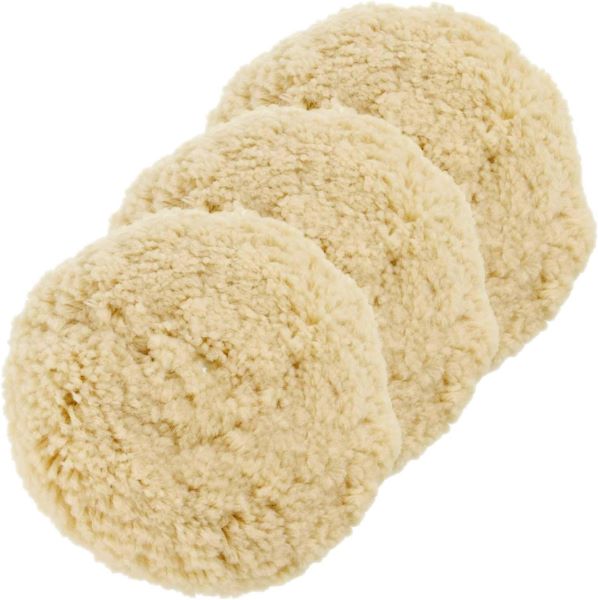
100% Wool Polishing Pads on Amazon
- 100% wool (My preferred choice since these perform significantly better than any of the synthetic blends)
- Hook and loop (Velcro) backing (these quickly attach to the backing plates of any polisher you choose)
- You will need at least 3 buffing pads (Even on a small dinghy boat you will go through more pads than you think - partly due to the fact that once you have begun to "cut" with a new pad, you realize how nicely they work compared to a pad that has been over-used)
Buffing Pad Cleaning Spur:
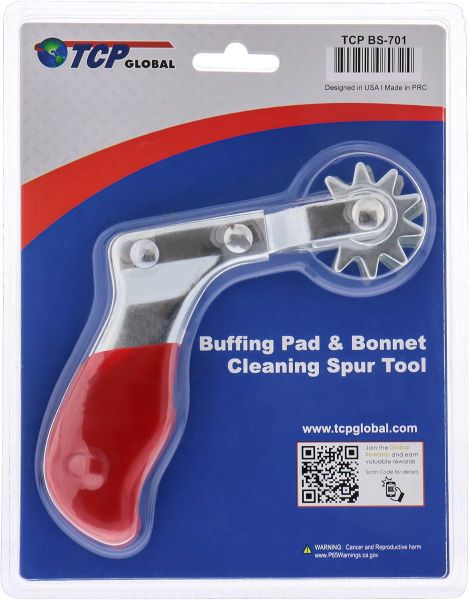
Buffing Pad Cleaning Spur on Amazon
- You will need this tool to keep your pad "clean" while you are polishing
- I use this tool after every 2 applications of compound (or in other words: after I have polished two small, working sections of the boat)
- I rest the buffer against my thigh, turn polisher on, and then use this spur on the pad fibers to release the spent compound and "fluff-up" the wool fibers
Choosing the Best Boat Polisher...finally!
Now that we understand that for true boat polishing a high-speed buffer (also most commonly called a rotary polisher) is needed, let me add some good news to the moment.
A quality boat polisher will be about deciding between just (2) different polishers. There really are only 2 polishers on the market that are considered worthy of choosing by any professional; myself included.
Just know that the buffers listed on this page represent virtually the only buffers you need concern yourself with as these are the industry standards and each one represents true professional grade equipment.
We are not talking cheap Harbor Freight (Horror Freight) tools here, but professional tools built to last decades of use. Like the adage says, "You get what you pay for" and if you think you are going to get a quality high-speed polisher for $40-$60, you are either very naive, delusional, or a little of both!
(added note: polishers and buffers are forever interchanged within the industry and are just a generalization. A good example is just like using the word "car" versus "auto")
Makita 9227C
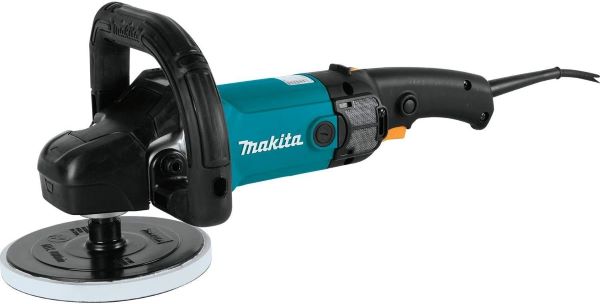
Makita Boat Polisher on Amazon
- Professional boat polisher.
- Can handle anything you throw at it.
- Soft start for smooth start-ups
- Speed control dial to set speed limit
- Can be dialed down to a very slow start/operating speed of 600 RPM's (ideal for fine polishing or the gun-shy, first time rotary polisher user)
- 600 - 3000 RPM speed settings.
- Bale handle is excellent for polishing sides of boats.
- I used one of these for years and never disappointed.
- I have used both this polisher and the DeWalt extensively for years.
DeWalt Boat Polisher
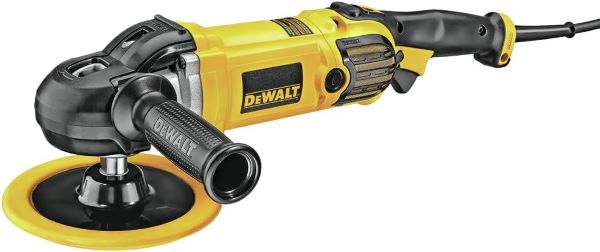
DeWalt Boat Polisher on Amazon
- Professional boat polisher.
- Can handle anything you throw at it.
- Soft start for smooth start-ups
- Speed control dial to set speed limit
- Can be dialed down to a very slow start/operating speed of 600 RPM's (ideal for fine polishing or the gun-shy, first time rotary polisher user)
- 600 - 3500 RPM speed settings.
- Also comes with bale handle excellent for polishing sides of boats.
- I used one of these for years professionally and never disappointed.
- I have used both this polisher and the Makita extensively for years.
Darren's Professional Tips About Boat Polishers
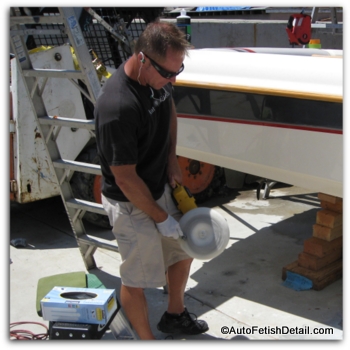 Here I am using the wool pad cleaning spur to clean the spent compound from the wool fibers.
Here I am using the wool pad cleaning spur to clean the spent compound from the wool fibers.Since all the (2) buffers I have laid out above represent true professional grade equipment, I can say that you can't go wrong with any choice you were to make.
Not only can they be set at very low 600 RPM speeds for finish polishing, but both can handle any heavy duty boat polishing you can throw at them. For these reasons, these car buffers are really your first choice for a quality boat polisher.
Just know that even if your boat still has some shine to it, you will not make much headway with a random orbital polisher and a foam pad as many would suggest. Because gel coat is such a "tough" material, it requires aggressive polishing that can only be had with a rotary polisher, a wool pad, and compounds formulated to deal with the demands of gelcoat.
Boat Polishing: Added Tips of Success
If you are a beginner, you will be very cautious when it comes to using a high-speed polisher like the one's above on your boat, keep in mind the following:
- Gel coat is extremely tough and durable. It is very difficult to screw it up even if you are a true beginner. Most of you will grossly underestimate just how much compound, speed, and friction is required to actually restore fiberglass to a high gloss and remove even small amounts of oxidation. You will use significantly more compound, pressure, and speed than if polishing a car. Do not make the comparison here as they are entirely different animals.
- Because all of these polishers have what is called "soft start" you can set the buffer to very low operating speeds that allow you to start off slowly, and work your way forward.
- As a rule, whenever I do fiberglass boat restoration, I only use a rotary, wool pad, and one compound. ( I simply adjust the speed, pressure, and duration of my polishing) Because gel coat is a completely different animal then clear coat on a car, you will not need to be concerned about swirl marks or holograms like on car paint.
- If you are familiar with polishing on cars with a buffer, you will go through dramatically more compound polishing a boat, than you do when polishing your car.
- When polishing your boat, you may find it necessary to tilt the buffer and polish with the edges of the pad. This will cause more heat and friction and allow the buffer and compound to become even more aggressive. Once the oxidation has been removed, simply finish polishing with the buffer as flat as possible to remove any buffer trails/swirl marks.
Good Polishing to Better Polishing:
Any of the polishers on this page are going to deliver professional grade performance. But there is more than just choosing a top rated boat polisher, polishing pads, and the right boat polishing compounds.
Having the right "accessories" will take your polishing experience to a much better experience if you are truly committed to learning this craft and performing like a true expert.
Pad Washer:
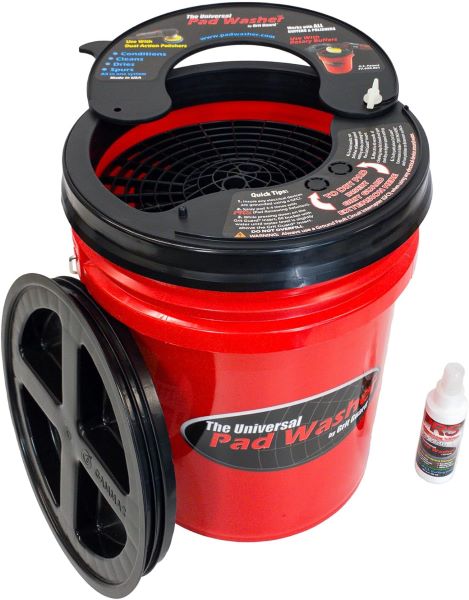
Universal Pad Washer on Amazon
- The best way to keep your pads clean and fresh during your boat polishing sessions. (or any of your polishing sessions)
- Will also extend the life of any of your pads: wool, foam, or micro-fiber.
- Ideal for eliminating the excess wool fibers right from the beginning by using the pad washer to season your wool pad even before the first application of polish/compound.
- Ideally suited for fiberglass boat restoration as you will be going through large amounts of compound during the process.
Boat Polisher Review:
It is both natural and automatic for most guys to think that polishing on a car is essentially the same as polishing on a boat. Just know that polishing your boat is just like polishing a car; but only if the following is taken into consideration:
- If your boat is in excellent condition and you are not trying to remove ANY oxidation, but simply trying to restore a little more shine.
- The actual physical act of holding a buffer in your hand, applying some form of polishing, and polishing a surface.
- Everything past that is very different.
Any first timer behind a rotary polisher, using a wool pad, and heavy duty compound will be in for a surprise if they already have experience polishing on cars. This is not to scare you away from trying to use a rotary polisher, scare you away from buying one, but simply inform you that polishing car paint, and polishing a boat or RV to remove oxidation is vastly different:
- The good news is that because gel coat/fiberglass is such a "tough" material, it is very difficult to actually screw it up.
- If you are actually trying to remove any level of oxidation, you will use far more polish, use far more pressure, use far more speed, use far more polishing time to remove the oxidation from your boat than you would if you were just polishing your car.
- But seriously...just go for it. In many ways it is far safer than polishing on a car due to gel coat being such a durable or tough material. But to actually remove heavy oxidation from your boat, just know it will require plenty of work; but the finished results are very rewarding.
I hope I have helped expand your mind and can go away with much more understanding on this topic!
Sincerely,
Darren Priest
- Home
- Auto Polisher
- Boat Polisher
|
|
